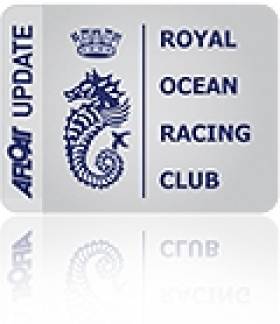Displaying items by tag: De Guingand
Trentesaux Victory in RORC's De Guingand Bowl Race
#rorc – A good mix of 89 British and French yachts started the Royal Ocean Racing Club's De Guingand Bowl Race on Friday evening, heading (eventually) to a sunny Cherbourg writes Race Reporter Louay Habib. Racing under the IRC rating system, the French JPK 10.80 'Courrier du Leon' sailed by Géry Trentesaux was the overall winner. This was his third win in the RORC Season's Points Championship, and he retains the overall lead for the 13 race series.
"It was a great race with a beautiful start, we were under spinnaker all the way to Brighton." commented Géry Trentesaux. "We had a good upwind course around the Isle of Wight to the Needles, I think that we did very well upwind. Courrier Du Leon is a good offshore boat, not especially fast in the light downwind but upwind the boat has good performance. I have been sailing with good crew for 20 years and we have three Figaro sailors on board for this championship, who are great all-round sailors and comfortable in a smaller boat. This race did suit the smaller yachts, as we arrived in Cherbourg at maximum speed with the tide; but judging the tide in the Channel is very difficult as the wind can vary so much. The course was excellent for this race, perfect for the conditions."
Le Havre skipper Noel Racine, racing JPK 10.10 Foggy Dew, was the winner of IRC Four and second overall. Louis-Marie Dussere, also from Normandy, racing JPK 10.10, Raging Bee, was the winner of the IRC Two Handed Class. Raging Bee now has a commanding lead in the two handed division for the season. Michel Peretie's French A40, Stamina III, was the winner of IRC Two, taking line honours for the class.
British success in the De Guingand Bowl Race came for Nick Jones from Chichester, Sussex, racing First 44.7, Lisa. Nick and his team won IRC One and was placed third overall. Two British yachts returning to RORC racing this season were also victorious. Philip Rann's Frers 92, Bristolian, skippered by John Burnie, was the winner of IRC Zero and placed fourth overall. Tony Lawson's Concise8, skippered by Jack Trigger, won the Class40 division, and Hampshire skipper John Allinson, racing J/109 Jumbuck, was third in IRC Three, beating seven other J/109s to Cherbourg.
The race committee led by RORC Racing Manager Nick Elliott, set a 146-mile course for the De Guingand Bowl Race. Starting between two committee boats, east of Cowes, the fleet headed east out of the Solent past No Man's Land Fort, Owers and Rampion Met Mast before returning to Owers then past St.Catherine's Point. Along the south side of the Isle of Wight the fleet encountered a variety of wind conditions, on their way to the Needles Fairway Buoy, before heading south to cross the English Channel. IMOCA 60, Artemis Ocean Racing, skippered by Mikey Ferguson, took line honours for the race, completing the course in under 13 hours. Most of the fleet took 20 hours or more to complete the race.
Nick Jones', skipper of Lisa, winner of IRC One and third overall had good reason to finish the race quickly. "When you have Géry Trentesaux closing in from behind in a little boat and the Maxi Bristolian long disappeared over the horizon, you don't really expect to come third overall, so it was a bit of a surprise to get on the podium. Judging the tide across the channel was key, we have done it so many times before but you have to factor in the wind strength. We had about 12 knots at a 50 degree wind angle and we were confident that this was stable, but we hedged our bets a little earlier on. But hour by hour we changed our tactics and eventually put the bow down and went for it. As I say, a bit of a surprise to do so well overall but I personally I had another incentive, my wife Suzie couldn't be with us as she is about to give birth to our first child but I have managed to make it home before the arrival.
After the race, an informal Prize Giving was held at the Yacht Club de Cherbourg attended by over 200 sailors. Bottles of Champagne were given to prize winners by RORC Commodore Michael Boyd. Racing for the RORC Season's Points Championship continues with the East Coast Race from Burnham to Ostend on the 12th June.






























































